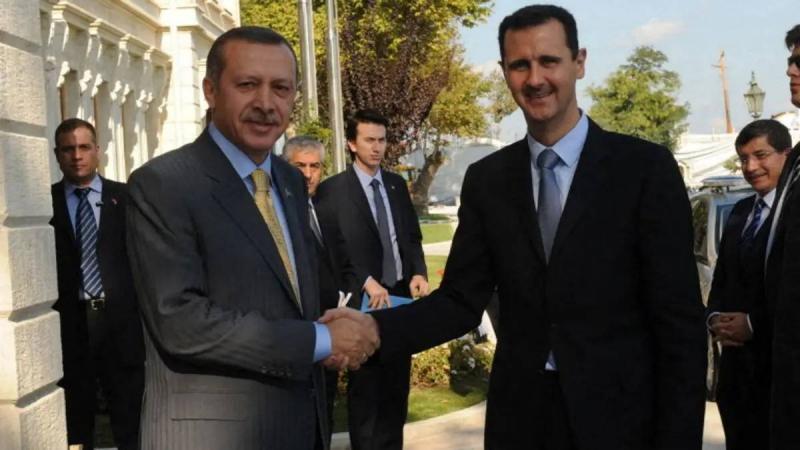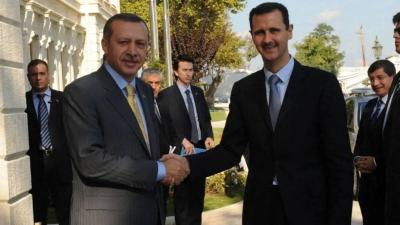At a time when Damascus announced that any normalization of relations with Ankara should be built on the foundations of withdrawing Turkish troops from northern Syria and halting support for "terrorist groups," reports revealed a two-pronged Turkish plan to address the issue of Syrian refugees based on the potential normalization of relations with Syria. According to reports circulated by Turkish media on Sunday regarding the plan discussed behind the scenes in Ankara, it is being studied under the title "Integration and Return" and will be implemented in two phases: the first involves integrating Syrians who do not wish to return to their homeland, and the second ensures the safe return of refugees if an agreement is reached with the Syrian government.
**Plan for Refugees**
The government-friendly newspaper "Türkiye" stated that with the increasing chances of a meeting between Turkish President Recep Tayyip Erdoğan and his Syrian counterpart Bashar al-Assad, despite the Syrian foreign ministry's statement issued on Saturday reiterating the condition of Turkish military withdrawal from northern Syria and ending support for terrorist groups, new frameworks concerning refugees in Turkey are being developed. According to Nuray Babacan, a writer for the "Bangri" news site, the plan to repatriate migrants is behind Erdoğan's scheduling of the meeting with Assad, and the Ministries of Interior and Foreign Affairs, along with the General Staff of the Army, are working on it following the crisis caused by the community’s rejection of the refugees' continued stay, which threatens to escalate into chaos in the foreseeable future.
In an article on Sunday titled "Syria and the Refugee Crisis... Assad's Multi-headed Plan," Babacan noted that "the Migration Administration under the Ministry of Interior (Turkey) is studying the plan from all its aspects, and there is a possibility of establishing a council to coordinate migration policies within the Turkish presidency." She pointed out that "all this work is under the supervision of Foreign Minister Hakan Fidan, whom Erdoğan tasked with preparing for the meeting with Assad."
Babacan added that Vice President Cevdet Yılmaz is preparing to establish a "Coordination Council" under the presidency, which will work on a roadmap that includes all ministries concerned with the refugee and migrant crisis, based on a two-pronged action plan: one focused on integration policies and the other on the safe return of refugees to Syria.
She indicated that "the chaos that could stem from the economic crisis and the refugee and migrant issue frightens the government, and the new plan relies on establishing good relations with Damascus. However, this alone will not be sufficient given the recent observed potential for the Syrian opposition in the safe zone created by Turkey on the border to turn against Ankara at any moment, as there are factions interpreting Turkey's rapprochement with Assad as a (Turkish betrayal) of the opposition."
Babacan quoted sources in the ruling "Justice and Development Party" declaring that "if Turkey engages with the Syrian administration without its normalization efforts facing obstacles, it will need to assess what it will give, not what it will gain." She summarized the topics on Turkey's agenda for the meeting with Assad as "maintaining the unity of Syrian territory, ensuring the safe return of those who were forced to migrate from their homelands and securing the appropriate conditions for that, ensuring the Syrian government returns the properties of returning Syrians, and eliminating terrorist organizations that have controlled large areas of Syria—referring to the People's Protection Units (YPG) led by the Syrian Democratic Forces (SDF), which control about 30% of Syrian territory and threaten Turkey's security."
Babacan also mentioned discussions regarding the establishment of a stimulating mechanism for the return of refugees from Turkey to their homeland through resolving property issues and formulating a new plan concerning the integration of remaining refugees, wherein asylum seekers working informally would need to be registered as laborers under certain conditions for their work and residence permits.
Foreign policy experts in Turkey have called for involving the "European Union" in the process concerning such a complex and troublesome issue. Babacan stated that European countries, which use Turkey as a buffer zone for migrants, need to create a new fund for this plan to succeed, otherwise, there is a significant risk of being hit by a wave of refugees.
Furthermore, the newspaper "Türkiye" reported that Turkish business sector officials have long been demanding the employment of registered laborers among refugees through obtaining work and residence permits, and if integration policies are implemented, the first step toward ensuring their registration in the workforce will be taken. She noted that "policies will be developed on how to ensure the integration of those who do not wish to return to Syria across various aspects, including cultural adaptation in Turkey, work, residence, and language."
**Motives for Normalization**
Meanwhile, questions are rising about the motives behind Erdoğan’s repeated calls for Assad to hold a meeting to restore relations between the two countries to how they were in the past. According to a writer for the pro-government newspaper "Hürriyet," Ahmet Hakan, citing insights from Turkish officials during his visit with Erdoğan as part of the media delegation to the 75th NATO summit concluded in Washington on Thursday, there are two primary reasons for Turkey’s desire to make peace with Assad.
He explained that the first reason is to prevent the PKK's efforts to establish a "terrorist state" in northern Syria and to protect the territorial integrity of Syria, and the second is the existence of nearly 4 million Syrian refugees, which Turkey wants to ensure the return of a significant portion of, if not all of them, to Syria. Regarding the situation of the armed factions under the Turkish-backed "Syrian National Army," Hakan indicated that officials confirmed Turkey would continue to protect this army.
**Will the Meeting Between Erdoğan and Assad Succeed?**
In the same newspaper, the writer Fatih Çekirge questioned whether a meeting between Erdoğan and Assad would indeed be held, stating that the likelihood of a meeting remains high, despite the Syrian foreign ministry's statement. He raised another question about the potential for this meeting to result in a solution, responding that "it's difficult" since Assad lacks the capacity to change the existing structure in Syria, where the U.S. controls the Kurdish units and seeks to establish a Kurdish state on the Turkish border, which could result in chaos if Trump were to regain the presidency in the U.S. and insisted on withdrawing American forces amid Congressional opposition.
Çekirge noted that looking towards the west over the sea, Russia controls the ports of Tartus and Latakia, and Russian President Vladimir Putin has secured the right to use them indefinitely in exchange for protecting Assad, allowing Russia—long seeking access to warm seas—to finally establish a military foothold in the eastern Mediterranean. For this reason, Putin is unlikely to easily abandon Assad.
He added that "Iranian militias are also present on the map, and Assad's relationship with Iran is known; there is clear cooperation against Israel, and Iranian influence is evident. In the potential meeting between Erdoğan and Assad, the Iranian factor must be taken into account, as Assad cannot make decisions on his own, and the existing powers could ultimately form an (invisible front) against Turkey."
Çekirge pointed out that "Erdoğan pays great attention to his relationship with Putin, and moving to open the door for talks between Ankara and Damascus at the presidential level is the right move for regional stability, but care must be taken that a meeting with Assad will not be sufficient; Turkey must be ready for a long race of negotiations with other significant actors in Syria.”
He clarified that "the meaning of Turkish operations in northern Syria and the bases established there has now become clearer, as Turkey, like other foreign countries that have established a sphere of influence in Syria, has reached an effective position in the decision-making process thanks to these operations and bases, meaning it has taken the necessary steps to be (on the ground and at the table). Additionally, the existence of threat factors clarifies the meaning of Turkey's statement: (Let security be ensured in Syria, then we can discuss the issue of withdrawal)."
He concluded that the relationship between Ankara and Damascus is not a diplomatic evaluation that would yield immediate results, but even starting it has value.




